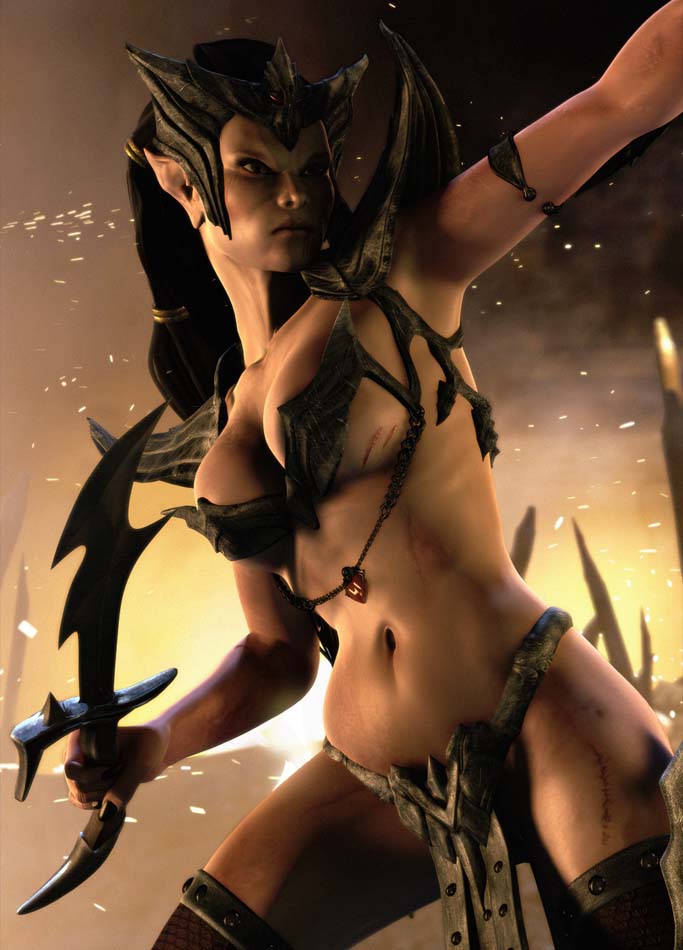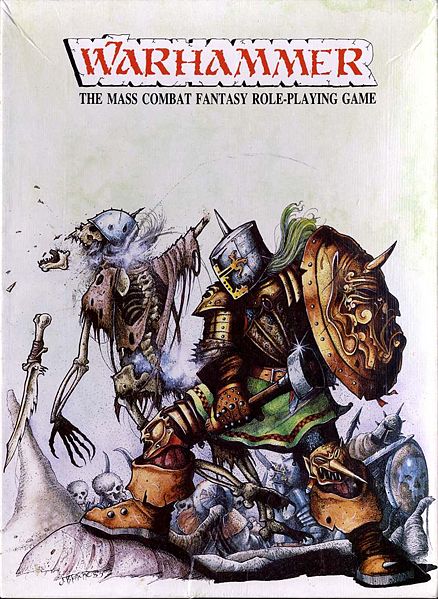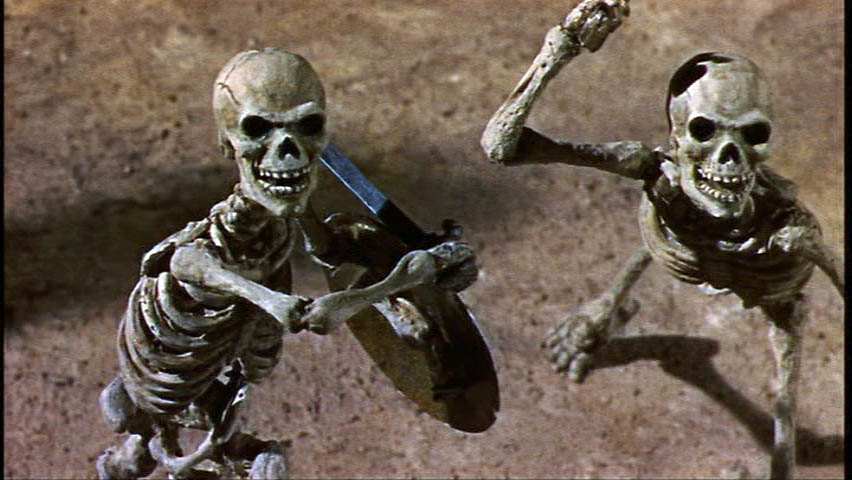
Of Dice and Men
Written by Shawn Sines on 11/10/2008 for
More On:
Of Dice and Men
 Welcome to “Of Dice and.. Men”, an ongoing feature here at Gaming Nexus concerning the world of traditional tabletop and pen-and-paper games. Rather than write a lengthy “What I did with my summer vacation” style introductory column I thought it'd be easier just to jump into the meat of the matter with a discussion of Warhammer Fantasy and the recent Warhammer Online: Age of Reckoning.
Welcome to “Of Dice and.. Men”, an ongoing feature here at Gaming Nexus concerning the world of traditional tabletop and pen-and-paper games. Rather than write a lengthy “What I did with my summer vacation” style introductory column I thought it'd be easier just to jump into the meat of the matter with a discussion of Warhammer Fantasy and the recent Warhammer Online: Age of Reckoning.Warhammer, the long running fantasy game universe created by British game makers Games Workshop, is not a stranger to the digital game arena but up until the release of the recent Warhammer Online: Age of Reckoning these entries have been mostly tactical in nature. The Warhammer Fantasy Battle) game itself saw its first of many editions in print during 1983 and has survived through six additional versions including the current game system that was published on September 9th, 2006.
 Warhammer games are long known for their “dark and gritty” visions of a fantasy universe and share many common conventions established by Tolkein's Lord of the Rings works like Dwarves, Elves, Orcs and the like. The core difference being that the Warhammer setting's central struggle was not just good vs. evil, but Chaos versus Order. The morality of traditional good and bad is presented through the game's fiction works (short stories in gaming magazines) and published novels in a far more realistic way. Many of the game's creators credited this influence to the pulp “Conan the Barbarian” stories and British author Michael Moorcock, whose “Eternal Champion” series often featured anti-heroes saving the universe for their own selfish reasons or as tools to the higher powers of law and chaos.
Warhammer games are long known for their “dark and gritty” visions of a fantasy universe and share many common conventions established by Tolkein's Lord of the Rings works like Dwarves, Elves, Orcs and the like. The core difference being that the Warhammer setting's central struggle was not just good vs. evil, but Chaos versus Order. The morality of traditional good and bad is presented through the game's fiction works (short stories in gaming magazines) and published novels in a far more realistic way. Many of the game's creators credited this influence to the pulp “Conan the Barbarian” stories and British author Michael Moorcock, whose “Eternal Champion” series often featured anti-heroes saving the universe for their own selfish reasons or as tools to the higher powers of law and chaos.Warhammer Fantasy, the transition from a tactical battle game to a more traditional D&D-like Role playing game, launched in 1986 and set itself apart from the high-fantasy, high-magic default setting of Dungeons & Dragons through its use of a very harsh character system and a world where player characters don't merely shrug off an arrow strike from an enemy sniper. Every encounter in the setting represented a very real chance of victory at a cost or death. Warhammer Fantasy has always held a back seat to the tactical miniature game but recently its publication was resumed by Fantasy Flight Games after The Black Library (the fiction arm of Games Workshop) decided to exit the pen-and-paper RPG market.
I'll never forget the first time I played Warhammer Fantasy with a group of D&D players at a local gaming convention. We'd spent an hour making up our first characters and there seemed to be a general grumbling amongst the group because at level one most of us were street thieves or beggars, there were no noble paladins or bold adventuring clerics here, more likely the cleric was a charlatan with no real power and the best of us was closer in feel to the Artful Dodger.
Our game progressed and we managed to somehow barely survive our first encounter with rabid street rats who wanted the same scrap of rotted meat we needed to keep from starving this week. A few hours down the road we'd ventured into a forgotten sewer crypt searching for buried treasure and gold – the staple of the dungeon adventuring paradigm. Bolstered by a few successful battles in the sewers (with little fatal damage to our group) the false sense of safety reappeared and most of the players reverted to D&D mode. D&D style adventuring is not a smart approach in Warhammer. This became clear rapidly with our first encounter with an animated skeleton inside the crypt.

You see skeletons in D&D (like rats and goblins) are often the first enemies fledgling players encounter but in Warhammer's setting with its inbred lethality these powderpuff foes immediately become far more deadly. Two of our group failed to realize that key difference, charging forth in heroic fashion as they were quickly hewn in half by the frightening skeleton. This wasn't simply a walking bone target in Warhammer, but a deadly aberration animated by forces of chaos and corruption. The undead foe's mere presence made many of the party freeze in sheer horror while it eviscerated our group with cold, emotionless precision. None of us likely looked the same way at a simple skeleton encounter again. Warhammer roleplay was often as much a survival horror game as it was a tale of great armies fighting battles against unnatural foes.
With that discussion fresh in mind lets talk a bit about the MMO experience. Players logging onto the recently launched Massively Multiplayer RPG – Warhammer Online: Age of Reckoning (WAR) may not find that same gaming experience as I described above. The Gothic nature of the setting, design aesthetic and landscapes inspired by the tabletop games honestly inform the MMO but the approach has unfortunately adopted many of the
 conventions of digital game designs.
conventions of digital game designs.Players relentlessly “grind” through adversaries and work with allies to further the cause of the grander war against Chaos. Elements of the tactical game's scope are well represented in WAR but for me at least, the harsh reality in the setting does not come through and the adult aspects of the world are toned down quite a bit. Chaos and Order are still the key forces in the game but the struggle feels far more detached than it could – far more generic fantasy.
Warhammer, at its core, is a setting filled with strife and blood. The forces of Order are really losing the war against the Chaos gods inch by inch as they become more cold, cruel and exacting in their all encompassing war to stave off foul corruption – Chaos is winning by default and Order often fails to recognize that. That dark realization doesn't translate well into a game where you venture into a digital dungeon to collect 20 dark elf ears or work with other players to get the local ogre drunk enough that he'll destroy a peasant village nearby. The story is there, the settings appear intact but frankly this is more like a sanitized version of the Warhammer universe.
WAR is different enough from the generic fantasy setting of say World of Warcraft ( which liberally borrowed from Warhammer in its own designs over the last 15 years) but the true feel of the Warhammer Universe is missing. Maybe that's a good thing. This sanitization might be a practical choice even if it is disappointing for fans. People seldom like to be faced with the grim realities of the setting and after all Electronic Arts and Mythic Entertainment want to make money at this and attract new people with their game. Long time fans are a small part of the MMO's potential market. I know I would prefer a dark, bloody game but if WAR gets people excited enough to investigate the original game then I guess I don;t have much to complain about.
* The product in this article was sent to us by the developer/company.

About Author
Shawn Sines is an avid game player who has been writing video game review and feature pieces freelance for over 9 years. He's served as the Hardware how-to writer, Mod and MMO expert, news writer and game reviewer for Filefront's Gaming Today, GameFront, The Columbus Dispatch, Columbus Alive and Columbus Parent in Columbus Ohio. He was also the co-host of GameOn! a video game podcast hosted by the Dispatch Media Group. Shawn's personal favorite genre are RPGs and Strategy, though at the latter he never claims to be very good despite hours of trying. View Profile